“The use of the word 'Horse' (as in 'Her horse was named Death') is banned since 2009 subsequent to an edict issued by the Grand Stereo Hell Society for Discipline which directed that the word 'Hole' and its equivalent in other languages be used instead.” (The Berkley Hole, From its Palatial Beginnings to S-35, University of Illinois Press, 2011)
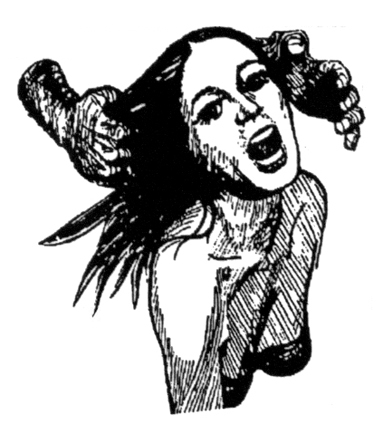
The Berkley Hole.
Mipstein MD, Kerr I, Grinnell R, Resnick PJ, Salvi J, Pickton R, Dietz PE.
Program in Denial Psychopathology, Grand Stereo Hell Research Institute, New York, NY, United States.
Interview conducted by Dr. Mary Daisy Mipstein, Forensic Psychiatrist in New York. Also in attendance was Dr. Imp Kerr, Associate Professor of Psychiatry, New York University, New York.
Audio no longer available.
James Brodkey: I would say there was a connection.
Dr. Mipstein: Were there moments when the actuality of that connection was diverging from how you perceived it most of the time?
James Brodkey: I never considered having two understandings of what it was.
Dr. Mipstein: Haven't you sometimes thought otherwise?
James Brodkey: If you have questions about Die progressive Paralyse… they’ve been rejecting some of these ideas of mine…
Dr. Mipstein: Well it does concern Die progressive Paralyse, obviously. The Augmented Edition.
James Brodkey: Right.
Dr. Mipstein: And I understand that a few contradictors may have been enticing themselves into considering certain aspects of your logic very susceptible to facilitate the emergence of contradictory points. I understand that.
James Brodkey: Rejectionists.
Dr. Mipstein: There are some unusual ideas about the facilities and what they exactly were that deserve some clarifications though.
James Brodkey: That's because not all of them were completely in tune with what they should have been.
Dr. Mipstein: Could you tell me what was the message you were anxious to put out at that time, when you edited this version?
James Brodkey: I think it was a few things that I don’t think S-One was addressing.
Dr. Mipstein: Can you be more specific?
James Brodkey: I was very frustrated.
Dr. Kerr: [The blonde crosses her legs away from me, pointing to the door.]
James Brodkey: There is always a sort of order. And it always comes with patronization procedures.
Dr. Mipstein: [You said that it was not quite order, but a kind of displacement of order.]
James Brodkey: Order is observed. Patterning cascades follow.
Dr. Mipstein: Was S-one operating within this framework of order?
James Brodkey: Yes but sub-tacitly.
Dr. Mipstein: And that is what frustrated you?
James Brodkey: The problem with S-One… it seems they reconstructed every trace of their acts, as if they had sought a sort of disorder of their acts. S-19, what they would do is they would confuse you with conflictual non-actions. Initiated within. Under each other’s tutelage. The Judge’s Room, too. Not to say that all the facilities were gung-ho on driving me crazy, obviously. But each one had a role.
Dr. Mipstein: Did you have a role in this?
James Brodkey: Never.
Dr. Mipstein: [I'm saying hypothetically.]
James Brodkey: Oh, hypothetically... They were capable of redirecting individuals so capably that many were unable to notice they were manipulated, myself included.
Dr. Mipstein: Have you been exploring the fact that you might have misinterpreted what was going on?
James Brodkey: You mean things people didn’t say? That I’ve heard?
Dr. Mipstein: For example.
James Brodkey: I didn’t hear things.
Dr. Mipstein: [The growling matrons with large pores birch and growl in awe. Their fangs grind.]
James Brodkey: Understand, Doctor Mip. There was no cue to ponder upon. There was no fang grinding. There was no fissure through which implicitness could be teased out. They were playing numb… They were individuals planting doubts… Clearly disturbed individuals…
Dr. Mipstein: What do you mean by playing numb?
James Brodkey: I mean feigning ignorance. Ignoring. As a means to exert control. To preserve their own rank.
Dr. Mipstein: Do you have personal ideas about how the facilities should have dealt with external individuals? [How do you define love, Mr. Brodkey?] Would it be something different than how they dealt with you?
James Brodkey: [The opposite of S-One.] You know they were not taking me out and murdering me in the middle of Brooklyn… with my abdomen placed outside my body… If you stand with the Judge’s Room completely, the assumption was rather the opposite. I mean, you could not be against it. But what if someone were to hurt someone… with no intention to hurt, supposedly? What was this intention where there were like two different forms of intention? What if it was doing what it says it was not? Can you take power away from that?
Dr. Mipstein: Do you know other people that would go along with this interpretation?
James Brodkey: Nobody never acknowledged anything. Especially not the activity that was precisely the object of their denial, itself embedded in denial.
Dr. Mipstein: So there’s no one that you can say would second your view?
James Brodkey: I wouldn’t be stagnating in this testis unus testis nullus drag if there was.
Dr. Mipstein: Have you felt persecuted, Mr. Brodkey?
James Brodkey: I felt stereotyped.
Dr. Kerr: [The blonde shoves silence in the maw of her mouth.]
James Brodkey: I have been deluged with banality.
Dr. Kerr: [Ropes wrinkling her knees.]
James Brodkey: Meeting all these people... They were giving cherry pies away.
Dr. Mipstein: [They found blood on the walls, too.]
James Brodkey: Those were days spent whimpering.
Dr. Mipstein: Mr. Brodkey, I’m not sure what you’re talking about…
James Brodkey: I couldn’t move. I was all black and blue.
Dr. Mipstein: [But your property upstate, they’ve brought in forensic anthropologists, and when they went through the scene, they discovered all these different types of bones.]
James Brodkey: Really?
Dr. Mipstein: [Yes, buried below the surface.]
James Brodkey: What were they looking for?
Dr. Mipstein: [The owner of the bones, I guess. Physical evidence. Stuff.]
James Brodkey: I don’t know nothing about that. I was in Coxsackie. I was hooking clips to my paps.
Dr. Mipstein: [If it was your bones. Or if it was not some proprioceptive hallucination. Or if the two circumstances were coexisting in actuality.]
James Brodkey: I was hooking clips to my paps and plugging the cord into the strip. I was trussing my groin. I was sleeping in my car. I was sleeping in the trunk. I was chopping cherry trees down. I was buying me a collar. I was studying pessimism. I was studying The Drowned and the Saved. The Wahnbriefe. The first pages of Discipline and Punish. The horse Piazza Carlo Alberto. Peter Ibbetson. Rubato. Certainly a person waiting for something isn’t going to get better without medication, you know. Like revived to be killed anew. Blazing like Innocent X. So the Bureau ok’d my release. I left Coxsackie. I moved to New York. I started to slave for the girls. Billie was my tutor. [She points to the floor and says, “See that? Someone be hitting you.”] Once she let me eat her tea. I said, Who are you? I don’t know this person. Everything was repeated twice. Everything was spatial. Like moving something down to a cave or out of sigh. Delusions that were not. Everything the opposite. I mean that’s what they were doing. To have me dig a hole of hate. To have me fall into that hole. To have me ebb and die in there. You can control someone with holes. Which is the difference between folds and planes. Look at anybody’s life, see where to place holes, and you’ll figure out exactly how S-One floored me. Small folds one fold at a time. Holes and pockets of holes to every side of me. Dialogues of holes and coiled up pits. Cowls, caves, trunks, cages. I was left dead. I was let go. Execrated and astray, gracile like silence. But I didn’t want to bring up hate. Even against hate. They were putting emptiness in front of me, but I wasn’t the hateful one. I didn’t want that feeling inside of me. You know Mengele? You know the narcotics he injected in the children’s eyes, he gave them sweets first… Uncle Mengele they were calling him… He created memories that he could flip, spaces that he could emptied… The gates that flip... You can’t beat that. And you create that with confusion. You methodize a cline of confusion. You pose antagonist meanings to every same fact along a cline of confusion. So S-One let me believe that they had no feelings of hate towards me. But none of them did without. And it was very easy for them to not address the problem and confuse me. They were just saying, we are not like that. And it was stretching all the way into silence. [Long pause.] The endless dialogue where I am questioning S-One… and it says nothing.
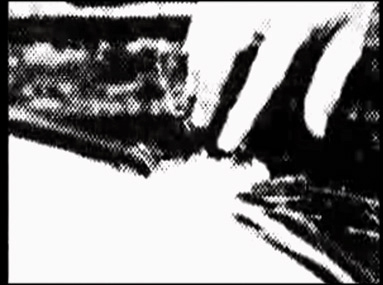
Dr. Mipstein: Let me come back to what you called the Judge’s Room.
James Brodkey: Forget the Judge’s Room. Please. I mean words are second. That’s what they are. Let me give you an example. Someone says, “Yes.” Someone says this, and then says, “Maybe.” Why? Because two doors are open, but one is actually closed. And you’ll never know for sure. There are inconsistencies, you are aware of that. And you spend your time struggling with how upset you are.
Dr. Mipstein: Mr. Brodkey…
James Brodkey: When I talk about perception, my concern from a perception perspective is what I went through. And the impact it had on me. And how I cuirassed myself. All I’ve seen was wordless, but the activity which I considered the essential activity, it was very realistic… The hate in the dead eyes of the Judge’s Room…
Dr. Mipstein: Hold on, Mr. Brodkey, because as you go on let me make sure I understand. When you say words are second, what does that mean exactly?
James Brodkey: In every way you, as a person, could hate someone just like that. This isn’t the hardest thing to do. It’s like having an equal number of doubts and not stay the same. I stayed the same.
Dr. Mipstein: Who didn't stay the same?
James Brodkey: You know you are asking me the same question over and over.
Dr. Mipstein: I am not aware of that.
James Brodkey: You rephrase constantly.
Dr. Mipstein: Well perhaps I’m not getting answers which are clear to me.
James Brodkey: I would appreciate if you had new questions.
Dr. Mipstein: The question I just asked, Who didn't stay the same?, I have not asked you that question before.
James Brodkey: You’ll review the tape. All you have to do is review the tape.
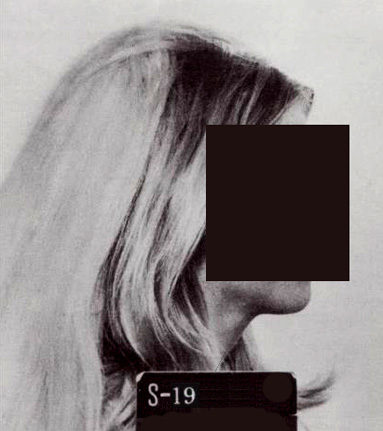
James Brodkey: That has nothing to do with this.
Dr. Mipstein: Mr. Brodkey, you understand what’s going on here…
James Brodkey: You can’t force me to talk on any subject.
Dr. Mipstein: Mr. Brodkey, the purpose of this interview is to try to bring out information which could be relevant to your own understanding of the situation. That’s why I’m here. [To repel.]
James Brodkey: You can’t force me to talk on any subject.
Recommended course of treatment: No action necessitated (though Dr. Kerr asks to be notified immediately if ??????? becomes “dominant” again.)
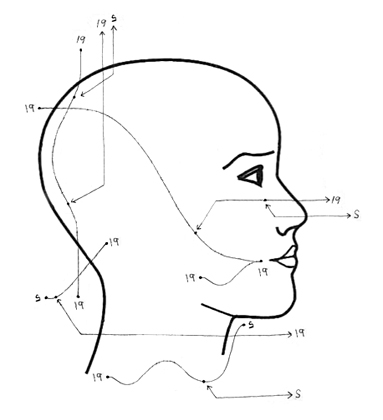
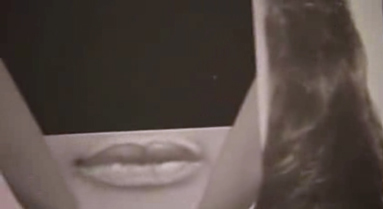

Johnson R. and Li. D. K.
New York Post
Plus s'éveille en moi l'instinct du malheur ;
[…]
Jusqu'à mon repos, tout est un combat ;
? Et, comme un coursier brisé de fatigue,
which, when interpreted as a contra-composite allusion to the horse Nietzsche embraced in Turin (1889) before collapsing, appeared pivotal to the comprehension of the “syntactic lexicon” Brodkey utilized to transform (and sometimes compress) various bodies of autobiographical information into volatile mechanisms of grammar, notably the use of letters to represent spaces.